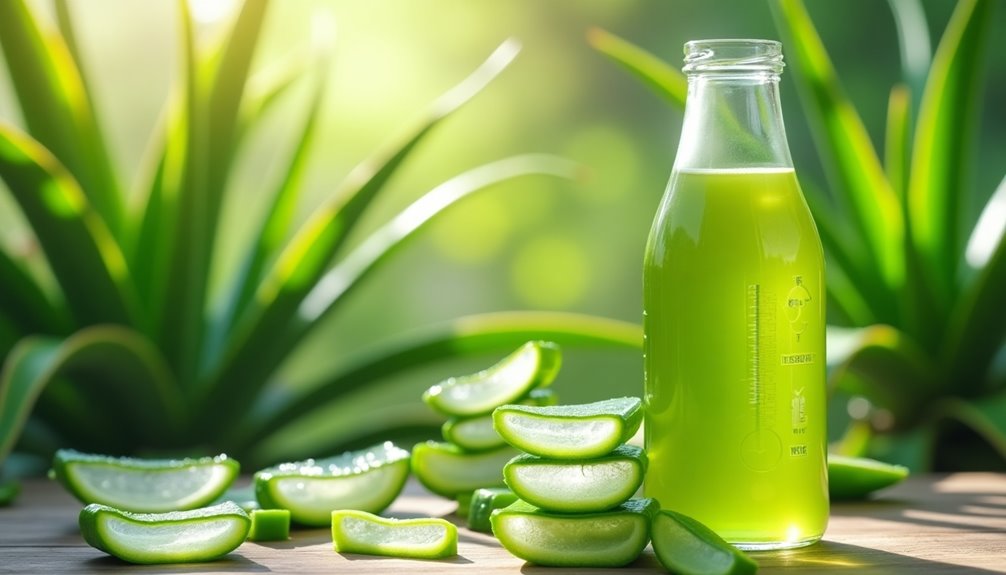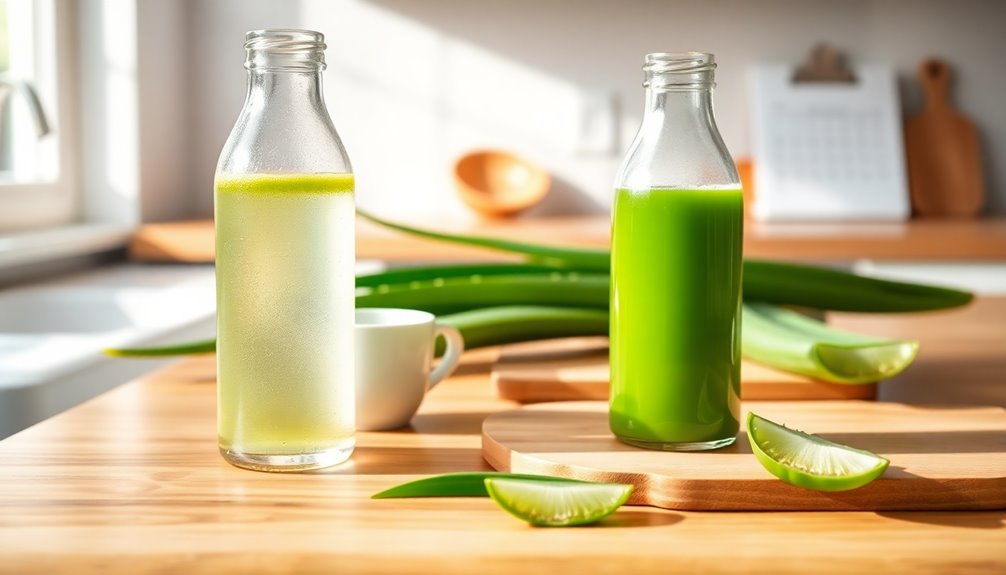Aloe vera juice is good for 1 to 2 years when it's unopened. Once you open the bottle, consume it within 30 to 60 days for the best taste and quality. Store it in a cool, dark place to maintain freshness. After opening, refrigeration helps slow down spoilage, but pay attention to any changes in color, odor, or taste. If you're curious about how to spot signs of spoilage, there's more to discover on that topic.
Key Takeaways
- Commercial aloe vera juice lasts 1 to 2 years unopened, and 30 to 60 days once opened if refrigerated.
- Homemade aloe vera juice should be consumed within one week due to the lack of preservatives.
- Always check the expiration date on the packaging for safe consumption guidelines.
- Signs of spoilage include changes in color, off odors, or altered taste; discard if any are present.
- Consuming spoiled aloe vera juice can lead to health issues, so prioritize freshness and safety.

When you're enjoying aloe vera juice, it's important to know how long it lasts. This knowledge can help you avoid consuming spoiled juice and ensure you reap the full benefits of this refreshing drink. The shelf life of aloe vera juice varies based on whether it's commercially produced or homemade, so understanding these differences can be crucial.
For commercially produced aloe vera juice, you can generally expect it to have a shelf life of 1 to 2 years when it's unopened. Just make sure to store it in a cool, dark place, away from direct sunlight. This helps maintain its quality until you're ready to enjoy it.
Once you open the bottle, though, that shelf life shortens significantly. It's typically recommended to consume opened aloe vera juice within 30 to 60 days. To keep it fresh, you should store it in the refrigerator. The refrigeration helps slow down the growth of bacteria and keeps the juice tasting its best.
When you buy aloe vera juice, always check the expiration date on the product packaging. This date provides a guideline for how long the juice should remain safe to consume. However, even if the expiration date hasn't passed, it's essential to be cautious. Sometimes, the shelf life can vary between brands due to the specific preservatives they use. So, if you notice any signs of spoilage, it's better to err on the side of caution.
If you decide to make homemade aloe vera juice, keep in mind that it has a much shorter shelf life. You should consume it within a week, and like its commercially produced counterpart, it needs to be stored in the refrigerator. Since homemade aloe vera juice lacks preservatives, it's more susceptible to spoilage. Always check for signs of spoilage before consuming.
Signs of spoilage in aloe vera juice can include noticeable changes in color, odor, or taste. If you see any discoloration or if the juice starts to smell off, it's best to discard it.
Even if the juice looks fine, if it doesn't taste right, don't take any chances. Consuming spoiled aloe vera juice can lead to unpleasant health issues, and no one wants that!
Frequently Asked Questions
How Long Does Aloe Vera Last in the Fridge?
Aloe vera juice lasts in the fridge for about 7 to 10 days once you've opened it, provided you store it properly in an airtight container.
If you've made it at home, aim to drink it within 3 to 5 days for the best quality and nutrients.
Always check for signs of spoilage like an off smell or color changes before consuming, even if it's within the suggested timeframe.
How to Tell if Aloe Vera Gel Has Gone Bad?
To tell if your aloe vera gel has gone bad, look for changes in color, like darkening or browning.
Pay attention to any off-putting odors or a sour smell.
If you notice the gel separating into a watery consistency or developing a slimy texture, it's time to toss it.
Always check the expiration date on the packaging, and if it's homemade, use it within a week if stored in the fridge.
Can Aloe Vera Juice Be Bad?
Yes, aloe vera juice can go bad. If you notice an off smell, changes in color, or sediment, it's best not to consume it.
You should store it in a cool, dark place and always refrigerate after opening to keep it fresh.
If you drink expired aloe vera juice, you might experience gastrointestinal issues like cramps or diarrhea.
Always check for preservatives that could impact its safety and shelf life.
When Should I Avoid Aloe Vera Juice?
When you're considering aloe vera juice, there are times you might want to think twice.
If you're expecting, have allergies to similar plants, or struggle with gastrointestinal issues, it's best to steer clear.
Those on blood thinners or diabetes medications should also be cautious, as it can lead to unexpected outcomes.
Always check with your healthcare provider first, ensuring you're making the safest choice for your health.
Better safe than sorry!
Conclusion
In conclusion, knowing how long aloe vera juice is good for is key to enjoying its benefits. Generally, unopened bottles last about 1-2 years, while opened ones typically stay fresh for 1-3 weeks in the fridge. As the saying goes, “a stitch in time saves nine”—taking care of your juice ensures you get the most out of it. So, always check expiration dates and store it properly to keep it fresh and effective. Additionally, it’s important to consider that different types of juice have varying shelf lives, prompting the question, “how long can you store apple juice? ” Generally, unopened apple juice can last for about 1-2 years as well, while opened juice needs to be consumed within 7-10 days when refrigerated. By understanding the storage requirements and expiration timelines of your favorite juices, you can maximize their flavor and nutritional benefits, ensuring a refreshing experience each time you enjoy them.
Cindy thoroughly researches juicing trends, techniques, and recipes to provide readers with practical advice and inspiration. Her writing style is accessible, engaging, and designed to make complex concepts easy to understand. Cindy’s dedication to promoting the advantages of juicing shines through her work, empowering readers to make positive changes in their lives through the simple act of juicing.











